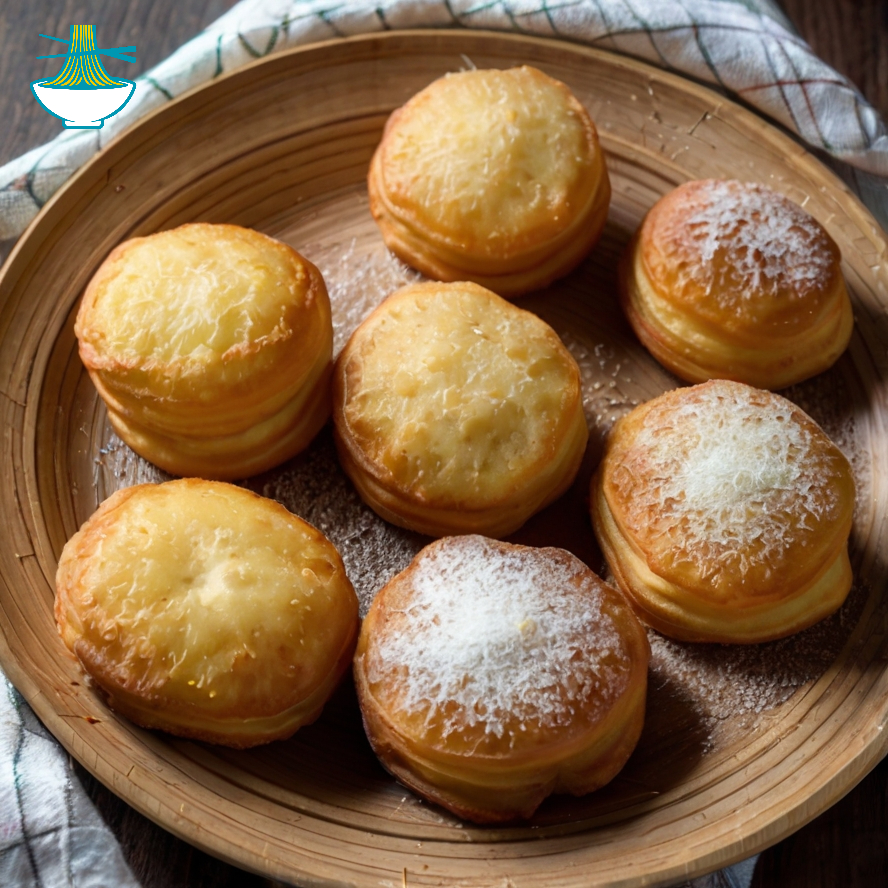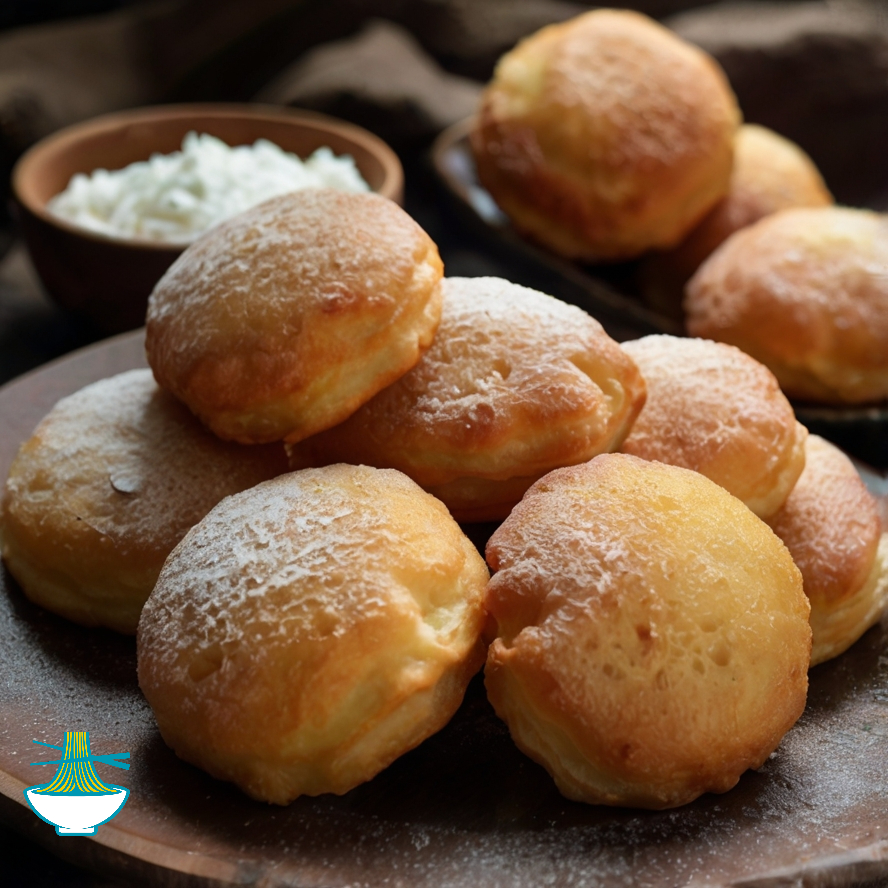Mikate, also known as puff-puffs, is a popular and cherished snack in the Democratic Republic of the Congo. These golden, fried dough balls are similar to beignets and hold a special place in Congolese cuisine. Often enjoyed for breakfast or as a midday treat, Mikate is loved by people of all ages for its delightful taste and fluffy texture.

Mikate has deep roots in the culinary traditions of the Congo, influenced by both African and European cultures. The introduction of wheat flour and frying techniques by European colonizers played a key role in shaping this beloved snack. Over the years, Mikate has become a symbol of Congolese food culture, representing warmth, comfort, and the joy of sharing meals with family and friends. Today, it continues to be a popular choice at gatherings and celebrations, reflecting its enduring appeal and cultural significance.
Ingredients:
- 2 cups all-purpose flour
- 1 teaspoon salt
- 2 tablespoons sugar
- 1 teaspoon baking powder
- ½ cup warm water
- ¼ cup milk
- Vegetable oil for frying
Directions:
1. Mix Dry Ingredients: In a large mixing bowl, combine the flour, salt, sugar, and baking powder. Mix well until evenly distributed.
2. Combine Wet Ingredients: In a separate bowl, mix the warm water and milk together. Gradually add this mixture to the dry ingredients, stirring constantly until a thick dough forms.
3. Knead the Dough: Transfer the dough to a floured surface and knead for a few minutes until it becomes smooth and elastic. Cover with a damp cloth and let the dough rest for about 30 minutes.
4. Shape the Dough: Once rested, divide the dough into small balls, about the size of a golf ball.
5. Heat the Oil: In a deep frying pan or pot, heat the vegetable oil over medium-high heat.
6. Fry the Mikate: Carefully place the dough balls into the hot oil, frying them in batches. Cook for 3-4 minutes on each side, or until golden brown and crispy.
7. Drain and Serve: Remove the fried Mikate from the oil using a slotted spoon, and place them on a paper towel-lined plate to drain excess oil. Serve warm, dusted with powdered sugar if desired.
Notes:
- The dough can be prepared in advance and stored in the refrigerator for up to 24 hours.
- If the dough is too sticky, add a small amount of flour to make it more manageable.
- Use a deep frying pan or pot to minimize oil splatters.
Nutritional Information:
While Mikate is a delicious treat, it is high in calories and fat due to the frying process. It should be enjoyed in moderation as part of a balanced diet.

Nutrition Value:
1. 2 cups all-purpose flour
- Calories: Approximately 910 calories
- Carbohydrates: 190 grams
- Protein: 25 grams
- Fat: 2 grams
- Sodium: 0 milligrams
- Cholesterol: 0 milligrams
- Vitamins: Contains small amounts of B vitamins, particularly niacin and riboflavin
- Minerals: Provides iron and calcium in modest amounts
- Nutritional Benefit: All-purpose flour is a primary source of carbohydrates and provides some protein. It contributes to energy levels and can be part of a balanced diet when consumed in moderation.
2. 1 teaspoon salt
- Calories: 0 calories
- Carbohydrates: 0 grams
- Protein: 0 grams
- Fat: 0 grams
- Sodium: 2,300 milligrams
- Cholesterol: 0 milligrams
- Vitamins: Does not contain significant vitamins
- Minerals: Provides sodium
- Nutritional Benefit: Salt enhances flavor and helps with fluid balance in the body, but excessive intake can contribute to high blood pressure and other health issues.
3. 2 tablespoons sugar
- Calories: Approximately 100 calories
- Carbohydrates: 26 grams
- Protein: 0 grams
- Fat: 0 grams
- Sodium: 0 milligrams
- Cholesterol: 0 milligrams
- Vitamins: Does not contain significant vitamins
- Minerals: Provides no significant minerals
- Nutritional Benefit: Sugar adds sweetness and energy but should be consumed in moderation to avoid excessive calorie intake and potential health concerns like weight gain and diabetes.
4. 1 teaspoon baking powder
- Calories: Approximately 5 calories
- Carbohydrates: 1 gram
- Protein: 0 grams
- Fat: 0 grams
- Sodium: 500 milligrams
- Cholesterol: 0 milligrams
- Vitamins: Does not contain significant vitamins
- Minerals: Provides sodium and a small amount of calcium
- Nutritional Benefit: Baking powder is used as a leavening agent to help dough rise, contributing to the texture of baked goods without adding significant nutritional value.
5. ½ cup warm water
- Calories: 0 calories
- Carbohydrates: 0 grams
- Protein: 0 grams
- Fat: 0 grams
- Sodium: 0 milligrams
- Cholesterol: 0 milligrams
- Vitamins: Does not contain significant vitamins
- Minerals: Contains trace amounts of minerals based on water source
- Nutritional Benefit: Water is essential for hydration and helps in the proper functioning of the body. It does not provide calories or nutrients but is crucial for overall health.
6. ¼ cup milk
- Calories: Approximately 30 calories
- Carbohydrates: 2.5 grams
- Protein: 1.5 grams
- Fat: 1.5 grams
- Sodium: 30 milligrams
- Cholesterol: 5 milligrams
- Vitamins: Provides vitamin D and vitamin B12
- Minerals: Contains calcium and potassium
- Nutritional Benefit: Milk provides essential nutrients like calcium, protein, and vitamins, contributing to bone health and overall nutrition.
7. Vegetable oil for frying
- Calories: Approximately 120 calories per tablespoon
- Carbohydrates: 0 grams
- Protein: 0 grams
- Fat: 14 grams per tablespoon (primarily unsaturated fats)
- Sodium: 0 milligrams
- Cholesterol: 0 milligrams
- Vitamins: Can provide vitamin E if using oils like sunflower or canola
- Minerals: Contains trace amounts of minerals based on the type of vegetable oil
- Nutritional Benefit: Vegetable oil provides fats that are essential for cooking and can contribute to a balanced diet when used in moderation. However, excessive consumption can lead to increased calorie intake and potential health concerns related to fat consumption.


Comments